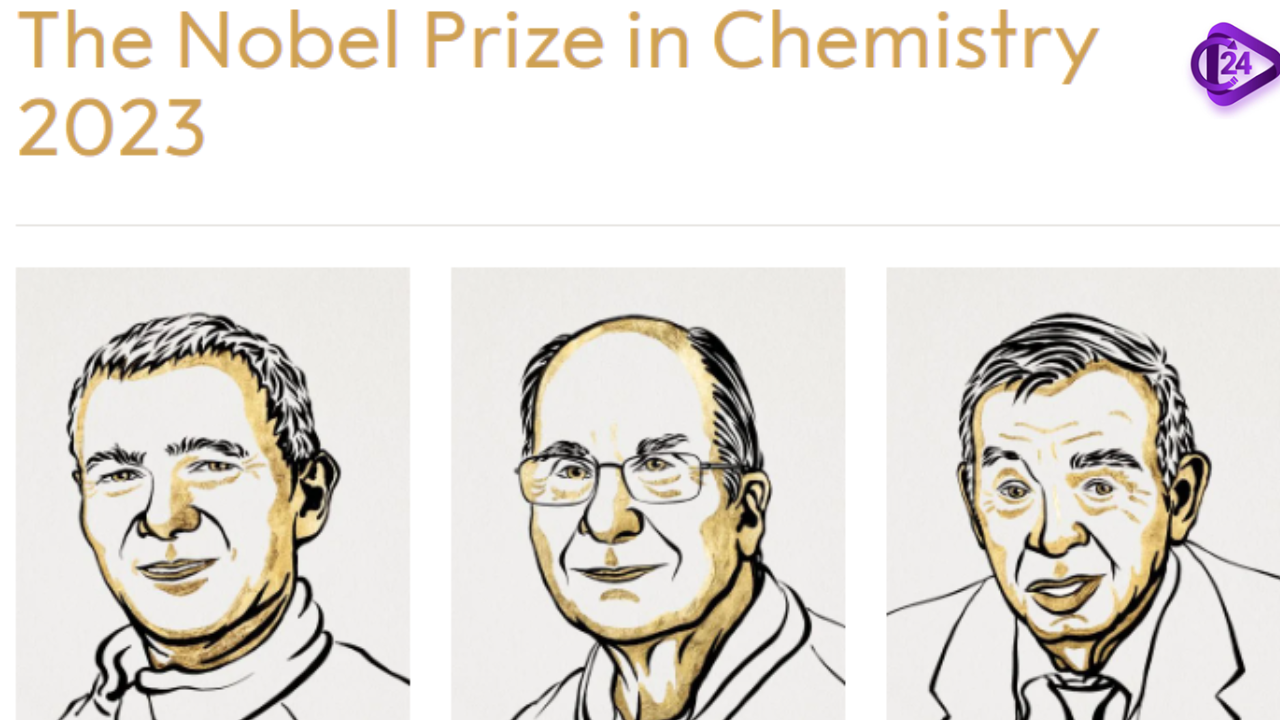Nobel Prize in Chemistry 2023 announced

In October 2023, the Royal Swedish Academy of Sciences selected distinguished scientists Moungi G Bawendi, Louis E Brus, and Alexei I Ekimov for the Nobel Prize in Chemistry 2023. They have shared the Nobel Prize for Chemistry 2023 for their groundbreaking discovery and synthesis of quantum dots. They will be awarded on December 10, 2023. The Nobel Prize is considered the most prominent award in six fields i.e. Medicine, Physics, Chemistry, Literature, Peace, and Economic Science. This award was named after Alfred Nobel, who discovered the Dynamite.
Nobel Prize 2023 in Chemistry:
-
The Royal Swedish Academy of Sciences, located in Stockholm, Sweden, has awarded the Nobel Prize in Chemistry 2023 to Moungi G Bawendi, Louis E Brus, and Alexei I Ekimov.
-
They have been awarded for their discovery and development of quantum dots.
Alexei Ekimov
-
In 1980, Alexei Ekimov, a Russian physicist, succeeded in creating size-dependent quantum effects in coloured glass.
-
The colour was from nanoparticles of copper chloride (CuCl).
-
During his work, he also demonstrated that particle size affected the colour of the glass via quantum effects.
Louis Brus
-
Later, the US Professor, Louis Brus proved the size-dependent quantum effects in particles floating freely in a fluid.
-
With this, he became the first scientist in the world to do so.
Moungi Bawendi
-
In 1993, an American Tunisian-French chemist, Moungi Bawendi transformed the chemical production of quantum dots, which results in almost perfect particles.
What is Quantum Dots?
-
Quantum dots are man-made nanoscale crystals, which can transport electrons.
-
Size range: 1 to 100 nanometers
-
Now, Quantum dots now illuminate computer monitors and television screens, which are based on QLED (organic light-emitting diode) technology.
-
They also add light to some LED lamps, and biochemists and doctors use them to map biological tissue.
-
Applications of Quantum Dots:
-
Display Technology (LED, Television screen)
-
Medical Imaging
-
Flexible Electronics
-
Slimmer Solar Cells
-
Encrypted Quantum Communication
-
Some interesting Nobel Prize for Chemistry:
|
Discovery |
Year |
Recipient |
|
Discovery of the laws of chemical dynamics and osmotic pressure in solutions |
1901 |
Jacobus Henricus van ‘t Hoff |
|
Discovery of the inert gaseous elements in air |
1904 |
Sir William Ramsay |
|
Discovery of cell-free fermentation |
1907 |
Eduard Buchner |
|
Discovery of the elements radium and polonium |
1911 |
Marie Curie, née Sklodowska |
|
Discovery of the so-called Grignard reagent |
1912 |
Victor Grignard |
|
Discovery of isotopes, in a large number of non-radioactive elements |
1922 |
Francis William Aston |
|
Discovery of heavy hydrogen |
1934 |
Harold Clayton Urey |
|
Discovery of the fission of heavy nuclei |
1944 |
Otto Hahn |
|
Discovery that enzymes can be crystallized |
1946 |
James Batcheller Sumner |
|
Discovery of catalytic properties of RNA |
1989 |
Sidney Altman and Thomas R. Cech |
Indians won the Nobel Prize in Chemistry:
|
Recipient |
Year |
Reason |
|
Venkatraman "Venki" Ramakrishnan |
2009 |
For the studies of the structure and function of the ribosome |
How many women won the Nobel Prize in Chemistry?
As of now, only eight women have won the Nobel Prize in Chemistry. The list of women recipients is as follows:
|
Recipient |
Year |
Reason |
|
Carolyn R. Bertozzi |
2022 |
She was awarded for the development of click chemistry and bioorthogonal chemistry |
|
Emmanuelle Charpentier |
2020 |
She was awarded for the development of a method for genome editing |
|
Jennifer A. Doudna |
||
|
Frances H. Arnold |
2018 |
She was awarded for the directed evolution of enzymes |
|
Ada E. Yonath |
2009 |
She was awarded for studies of the structure and function of the ribosome |
|
Dorothy Crowfoot Hodgkin |
1964 |
She was awarded for her determinations by X-ray techniques of the structures of important biochemical substances |
|
Irène Joliot-Curie |
1935 |
She was awarded for their synthesis of new radioactive elements |
|
Marie Curie, née Sklodowska |
1911 |
She was awarded for the discovery of the elements radium and polonium |
Some other facts:
Oldest Nobel Prize laureates: John B. Goodenough (in Chemistry 2019)
Youngest Nobel Prize laureates: Malala Yousafzai (Peace 2014)
Multiple Nobel Prize laureates:
-
J. Bardeen' (Physics 1956 & Physics 1972)
-
M. Curie (Physics 1903 & Chemistry 1911)
-
L. Pauling (Chemistry 1954 & Peace 1962)
-
F. Sanger (Chemistry 1958 & Chemistry 1980)
-
K. Barry Sharpless (Chemistry 2001 & Chemistry 2022)
-
ICRC (Peace 1917, Peace 1944, & Peace 1963)
-
UNHCR (Peace 1954 & Peace 1981)




